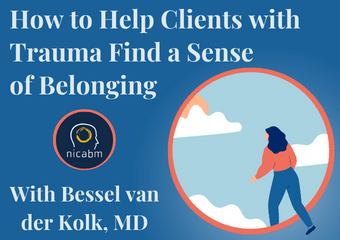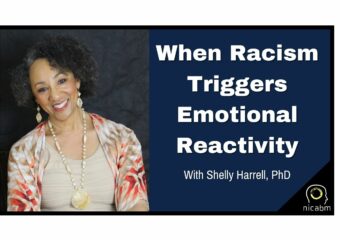When it comes to treating trauma, we’re often working with clients who have a low tolerance for distress. And when faced with traumatic memories or difficult emotions, they may respond by slipping into a state of hypoarousal to defend against the pain. So in the video below, Janina Fisher, PhD shares how she helps hypoaroused […]
Treating Trauma: Strategies to Help Clients Feel Safe
Trauma can rip away a client’s sense of safety . . . . . . and leave them with a nervous system that is primed to detect threats. That’s why as practitioners, it’s so important that we have strategies to build a client’s feelings of safety before we help them process traumatic memories. So in […]
Helping Clients Talk About Shame
When Clients are Reluctant to Talk About Shame Working with clients who suffer from deep feelings of shame can be a delicate and nuanced process – for a few reasons . . . To start, shame can disguise itself in a number of ways. It can hide beneath anger, outrage, self-sabotage, or abusive relationships. What’s […]
How to Help Clients with Trauma Find a Sense of Belonging, with Bessel van der Kolk, MD
When a client experiences trauma in childhood, and they aren’t able to develop crucial attachment relationships . . . . . . they may struggle to feel any true sense of belonging right up through adulthood. Instead, they can carry painful messages that they’re unwanted, unneeded, and never truly accepted. So in the video below, […]
An Intervention to Help Put Aside Resentment, with Terry Real, MSW, LICSW
One major challenge of working with resentment . . . . . . is that the more we try to confront it directly with a client, the stronger it can become. So in the video below, Terry Real, MSW, LICSW walks us through an intervention that can help clients “shelve” their resentment until they’re resourced […]
When the Fear of Rejection Leads to Appeasing Patterns
When a client fears rejection, their ability to set boundaries can become severely compromised. Instead of voicing their own needs and desires, they may go out of their way to please others in an attempt to be accepted. So in the video below, Ron Siegel, PsyD shares an example of one client whose fear of […]
An Exercise to Decrease Negative Self-Talk
When a client suffers from impostor syndrome, there is often a gap between how others perceive them . . . . . . and how they perceive themselves. This gap is what fuels that feeling that they’re a fraud – and the larger it gets, the stronger a client’s self-doubt grows. So in the video […]
Helping Clients Expand Their Comfort Zone
When it comes to treating anxiety, clients sometimes focus more on final outcomes than progress. But working with anxiety is often a daily process – a series of gradual (and often uncomfortable) steps to widen their comfort zone. So how can we motivate clients to embrace this process? In the video below, Kelly McGonigal, PhD […]
Working with Self-Harm: Pat Ogden, PhD with a Safe Replacement for Harmful Actions
In the aftermath of trauma, some clients turn to self-harm to relieve intense feelings of shame, anxiety, or even emotional numbness. Over time, these harmful behaviors can become addictive – and helping clients break that cycle can be a challenging process. So in the video below, Pat Ogden, PhD explains how she helps clients gain […]
When Racism Triggers Emotional Reactivity
For many clients, racism can be a deeply emotional topic. The experience of racism (and the scenes of racial injustice that occur far too often) can trigger a wave of painful emotions that threaten to shift clients into a state of reactivity and overwhelm. Shelly Harrell, PhD worked with a client who found herself in […]









